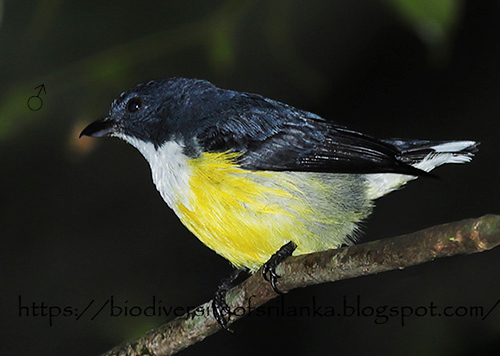Pages
- Home
- Flora of Sri Lanka
- Dragonflies & Damselflies of Sri Lanka
- Butterflies of Sri Lanka
- Freshwater Fishes of of Sri Lanka
- Amphibians of Sri Lanka
- Snakes of Sri Lanka
- Tetrapod Reptiles of Sri Lanka
- Mammals of Sri Lanka
- Resident Birds of Sri Lanka
- Migrant Birds of Sri Lanka
- Vagrant Birds of Sri Lanka
- Status Uncertain or Doubtful Birds of Sri Lanka
Showing posts with label Dicaeidae. Show all posts
Showing posts with label Dicaeidae. Show all posts
Saturday, March 15, 2025
Thick-billed Flowerpecker/මාතුඩු පිළිලිච්චා/ලැම ඉරි පිළලිච්චා [Matudu Pililichcha/Lema Iri Pilalichcha] (Dicaeum agile)
An uncommon breeding resident of forests, woodlands and well wooded home gardens from dry lowlands to adjoining mid hills. Rare and local in the wet zone. It lives as solitary birds or as pairs and feeds on juicy fruits, berries, nectar of flowers as well as the small insects and spiders. Thick-billed Flowerpecker lays two eggs in a closed, small pendulous nest, attached to a branch at the high canopy made with fibers and plastered with cobwebs. The breeding season lasts from March to July.
Sunday, February 19, 2023
පිළිලිච්චා/ලාතුඩු පිළිලිච්චා (Dicaeum erythrorhynchos)
පිළිලිච්චා ඉතාමත් සුලභ ලෙස දිවයින පුරාම පාහේ උස් තුරු මුදුන් වියන් වල සහ ගෙවතු වල දැකිය හැකි මෙරට වෙසෙන කුඩාම පක්ෂියාය. විවිධ පළතුරු වර්ග ආහාරයට ගන්නා පිළිලිච්චාගේ ප්රියතම ආහාරය වන්නේ විවිධ විශේෂයන්ට අයත් පිළිල ගෙඩි වන අතර පිළිලිච්චාගේ හොටෙහි ඇලෙන පිළිල බීජ ගස් අතු මත නැවත අලවා පිළිල ශාක විශාල ප්රදේශයක් පුරා බෝ කිරීමට මෙම පක්ෂියා මහත් දායකත්වයක් දක්වයි. පළතුරු වලට අමතරව කුඩා කෘමීන් සහ මකුළුවන්ද ආහාරයට ගන්නා පිළිලිච්චා වසරේ ජනවාරි සිට අගෝස්තු දක්වා කාලයේ පුළුන් සහ කෙඳි වර්ග ආධාරයෙන් ගසක ඉහල අත්තක් මත විශාල කොළ අතර එල්ලා වැටෙන ආකාරයට මල්ලක් වැනි කූඩුවක් තනා එහි බිත්තර දෙකක් දමා අභිජනනය කරයි.
English Post >>
Saturday, April 9, 2022
Sri Lanka white-throated Flowerpecker/Legge's Flowerpecker/ශ්රි ලංකා පිළිලිච්චා (Dicaeum vincens)
An endemic bird local and uncommon in forests and well wooded areas from southwestern wet lowlands to adjoining mid hills. Rarely occurs also in higher hills. It lives as solitary birds, in pairs or as little family flocks. Sri Lanka white-throated Flowerpecker feeds on nectar as well as varies fruits and wild figs found high up in tall trees. It breeds from January to August and female bird make a nest, a small felted hanging pocket among leaves high in a tree with the entrance at the top and lays two eggs.
Tuesday, February 5, 2013
Pale-billed Flowerpecker/පිළිලිච්චා/ලාතුඩු පිළිලිච්චා [Pililichcha/Latudu Pililichcha] (Dicaeum erythrorhynchos)
Very common breeding resident found all
over the Sri Lanka
සිංහලෙන් කියවන්න >>
Subscribe to:
Comments (Atom)



